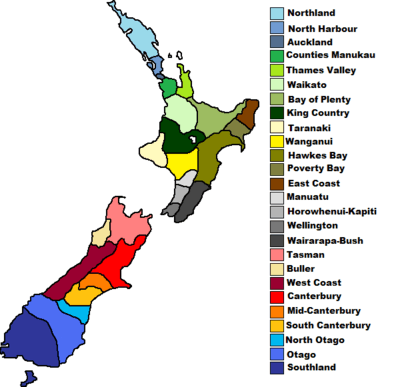Structure of rugby union in New Zealand
Rugby union in New Zealand is structured into four tiers. The top tier is composed of the national representative teams, with the men's team – known as the All Blacks – at the top, followed by other representative sides such as the Junior All Blacks and Māori All Blacks. These national sides are administered by the New Zealand Rugby Union (NZRU). Below this level is Super Rugby, where there are five New Zealand sides, each representing a different region of the country. Below this level is provincial rugby, the third tier – each province has a representative side that plays in either the semi-professional Mitre 10 Cup, or amateur Heartland Championship. These provincial sides are selected of Super Rugby players, and club players from within the province. Club rugby is the fourth and lowest tier, and consists of clubs competing in local leagues organised by a provincial union.

There are 26 provincial unions and each administrates their own club competitions. Within these provinces there are over 520 clubs who are affiliated both to their province and the NZRU. The number of clubs in each province varies from six for the smallest unions such as West Coast to more than 30 for bigger unions such as Canterbury and Auckland.
Level 1: Mitre 10 Cup Premiership Division
The Mitre 10 Cup, renamed from the ITM Cup after a 2016 sponsorship change, is fully professional and the competition usually runs from late July or early August to late October. From 2006, when the Mitre 10 Cup replaced NPC division one, through to 2010, the competition contained 14 teams in a nationwide tournament. Starting with the 2011 season, the Mitre 10 Cup was split into two divisions, each with seven teams—the top-level Premiership and second-level Championship. Each division remains a nationwide tournament. With the split into two divisions, promotion and relegation was reintroduced into the top level; the bottom side in the Premiership is relegated to the Championship and replaced by that division's champion.
The current Mitre 10 Cup Premiership teams, as of the 2019 season, are:
- Auckland
- Canterbury
- Counties Manukau
- North Harbour
- Tasman
- Waikato
- Wellington
Level 2: Mitre 10 Cup Championship Division
The Mitre 10 Cup Championship was created in 2011 by splitting the Mitre 10 Cup. Like the Premiership, it is a fully professional competition. As noted above, the champion of this division is automatically promoted to the following season's Premiership. With the split into three divisions, promotion and relegation was reintroduced into the top level.
The current Mitre 10 Cup Championship teams, as of the 2019 season, are:
- Bay of Plenty
- Hawkes Bay
- Manawatu
- Northland
- Otago
- Southland
- Taranaki
Level 3: Heartland Championship
The Heartland Championship is not fully professional. Like both divisions of the Mitre 10 Cup, the Heartland Championship is also a nationwide competition. The winners do not gain promotion to the Mitre 10 Cup, the Heartland Championship teams have remained the same since 2006. The Championship generally runs from late August to late October. The Heartland Championship contains 12 teams, 8 of which came from the NPC 3rd division in 2006 with the other already in the NPC 2nd division. The 12 teams in the Heartland Championship are:
- Buller
- East Coast (formerly NPC 2nd division)
- Horowhenua Kapiti
- King Country
- Mid Canterbury
- North Otago (formerly NPC 2nd division)
- Poverty Bay (formerly NPC 2nd division)
- South Canterbury
- Thames Valley
- Wairarapa Bush
- Wanganui (formerly NPC 2nd division)
- West Coast
Level 4 and below: Regional Leagues
The club season in New Zealand usually runs from March until late July or early August in any given year and amateur clubs compete on a regional basis. The sides play in intra provincial competitions against other teams from within their own provincial unions boundaries and this is the highest level of club play possible. There is no National club league, or nationwide competition for amateur club rugby.
Most of the 26 provincial unions have a number of divisions of club rugby within their province, particularly larger unions who may have as many as 6 or 7 tiers of club leagues. Some smaller Unions only have 1 division however. Some unions have promotion and relegation between their divisions, while in others, clubs are represented in several divisions, and in those cases, the players are promoted or demoted within their own club to/from that club's higher level team. Playing premier division one club rugby (also called "Seniors" in some provinces) in any union is the highest level of club rugby in New Zealand. In order to play in the Nationwide Representative competitions, The Mitre 10 Cup and Heartland Championship players must be selected, usually due to their form during the club season which precedes the Provincial representative season. Therefore, a representative player will play both for a club and a provincial team in the same season. This is grassroots rugby.
The System
|
Level |
League(s)/Division(s) | |||||||
|---|---|---|---|---|---|---|---|---|
|
1 |
Mitre 10 Cup Premiership Division | |||||||
|
2 |
Mitre 10 Cup Championship Division | |||||||
|
3 |
Heartland Championship | |||||||
|
4 |
Local Club Competitions | |||||||